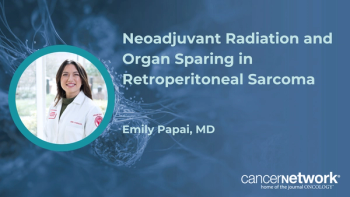
Lurbinectedin Effective in Early Trial of Advanced Ewing Sarcoma
Lurbinectedin demonstrated clear antitumor activity as a single agent in patients with advanced or relapsed Ewing sarcoma, according to results of a phase II trial.
Lurbinectedin demonstrated clear antitumor activity as a single agent in patients with advanced or relapsed Ewing sarcoma, according to results of a phase II trial.
Lurbinectedin blocks transactivated transcription and induces DNA double-strand breaks, according to Vivek Subbiah, MD, of the University of Texas MD Anderson Cancer Center in Houston. The agent could interfere with key processes involved with oncogenesis of Ewing sarcoma and similar tumors. Patients with advanced or relapsed Ewing sarcoma generally have very poor outcomes.
Subbiah presented results of one portion of a phase II basket study at the Connective Tissue Oncology Society (CTOS) 2017 Annual Meeting, held November 8–11 in Wailea, Hawaii. The trial was designed in a number of tumor types with unmet needs, including small-cell lung cancer, endometrial cancer, germ cell tumors, and several others; each of these “baskets” aimed to accrue 15 patients, and if two responses were seen then lurbinectedin would be considered active in that malignancy. If there was one response, it would accrue 25 more patients and look for two responses.
The Ewing sarcoma portion Subbiah presented included 25 adult patients who had received no more than two prior lines of therapy. The median age was 30, and 56% were male.
There were three partial responses (12%) in the trial, and 12 patients had stable disease (48%), for a disease control rate of 60%. Ten patients (40%) had progressive disease as their best response. The median duration of response was 11.7 weeks, and the median progression-free survival was 12 weeks. Subbiah said there were “no clear characteristics” that defined the responders as compared to the non-responders.
He said the drug’s toxicity profile was generally similar to trabectedin. Anemia and neutropenia were among the most frequent adverse events of any grade. Neutropenia was the most frequent grade 3/4 adverse event (52%), followed by anemia (16%) and thrombocytopenia (16%).
“Lurbinectedin as a single agent shows clear signals of activity in advanced Ewing sarcoma patients,” Subbiah said. The toxicity, he added, was easily manageable with dose reductions. “Treatment in combination with other agents is warranted.”
Because of the possibility that combinations may be effective, he said a phase Ib/II study is now planned involving lurbinectedin with or without irinotecan in patients with relapsed or high-risk chemotherapy-naive Ewing sarcoma.
Newsletter
Stay up to date on recent advances in the multidisciplinary approach to cancer.





































